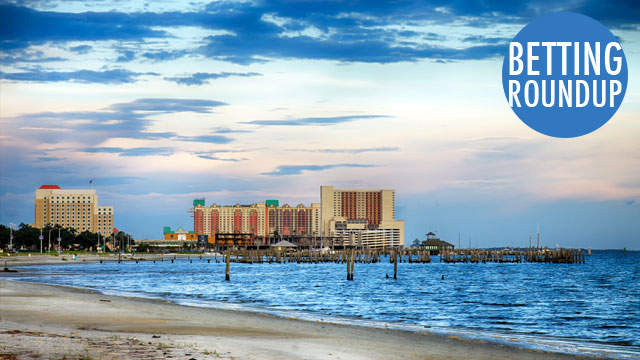Rhode Island, Mississippi and West Virginia are on track to be the next two states to have legal sports betting this year.
Rhode Island:
The spending spurt is attributable, in part, to $910 million in anticipated bets on sports wagering at the Twin River-owned casino in Lincoln and one Twin River is preparing to open in Tiverton. Budget writers are counting on the sports wagering to produce $23.5 million in new revenue for the state, an additional $14.75 million for IGT — which already runs the state’s electronic gambling network — and a projected $7.8 million more for Twin River after the bettors are paid their winnings.
Mississippi:
The state Gaming Commission on Thursday approved final regulations for sports betting at Mississippi casinos. The commission’s decision comes after a ruling from the U.S. Supreme Court lifting a ban that essentially barred sports betting outside Nevada.
In anticipation of the high court’s decision, the Mississippi Legislature legalized sports betting in a bill related to fantasy sports in 2017.
The new rule takes effect in 30 days.Commission Executive Director Allen Godfrey said the state’s casinos are already properly licensed to allow the game. Some of those casinos he explained are still awaiting the commission’s approval for equipment, such as kiosks that will be used to run the bets.
West Virginia:
West Virginia Lottery Commission, in an emergency meeting, has passed the rules governing the debut of sports betting at the state’s five casinos.
The Lottery Commission aimed to get the rules out as soon as possible, providing casinos with the framework they need.
“This will enable them to go forward to make sure their systems meet the requirements set forth in our rules, so that’s why we tried to get this done as soon as possible to expedite the process,” said state Lottery Commissioner Alan Larrick.
The overarching goal is to lay out what’s expected while also being up and running by football season.
“The goal, hopefully, would be when football season starts. If not, shortly thereafter,” Larrick said.
New York failed to pass new sports betting legislation before the deadline.
New York lawmakers failed to pass a new sports betting bill by Wednesday’s deadline, leaving state gaming officials with an outdated law to set regulations on how bettors can wager on sports this year.
It counts as a missed opportunity that leaves New York in a vulnerable position with neighbor New Jersey up and running and soon offering online wagering.
Barring a special session, New York lawmakers can revisit the sports betting bill when they reconvene in January 2019.
For now, state gaming officials are left to work with a 2013 law to determine how and when to issue sports book licenses and other regulations, but there are major flaws that place restrictions on bettors that will do nothing to dissuade them from taking their business elsewhere – either across the Hudson or to the illegal, underground market.
Congress postponed its sports betting hearing that was set for earlier this week.
The House Judiciary Committee announced Wednesday morning that the hearing titled “Post-PASPA: An Examination of Sports Betting in America” would not take place next week. The hearing in the Subcommittee on Crime, Terrorism, Homeland Security and Investigations had invited potential witnesses to testify, including the NFL.
The hearing was put on the committee calendar on June 19, but hours later was postponed. No new date for the hearing has been announced.
A source familiar with the hearing said the postponement was due to a “scheduling complication in unrelated policy areas.”
Home-team bias could affect odds as legal sports betting expands to new states.
Just think: the Eagles may be taking on the Las Vegas Raiders in a few years. The betting action at Pennsylvania books could be lopsided on the Eagles, while the action in Nevada might be heavy on the Raiders. Will the point spread on the game vary wildly from state to state?
Opinions vary, but the majority of bookmakers told ESPN they don’t expect to have significantly different lines to start.
Complicating matters further is the business arrangements made between racetracks outside Nevada and sportsbooks operators. Monmouth Park — a venerable racetrack in Oceanport, New Jersey — will split sports betting revenue 50-50 with its bookmaking partner William Hill, which arrived in Nevada in 2011 and now operates more than 100 venues in the Silver State. Monmouth Park, of course, will want William Hill to maximize profits at the track, while the bookmaker may want to consider its overall corporate bottom line.
“We don’t know what to expect until we get into the season and find out exactly what we’re up against,” William Hill’s director of trading, Nick Bogdanovich, said. “You can prepare to make a decision, but you really can’t until you’re into the fight. This will definitely be an easier question to answer come Sept. 6.”
* * *
Each Friday, we’ll comb through as many articles, tweets and podcasts as we can find related to the world of sports betting and daily fantasy sports, and publish the good stuff here.
Stumble upon something you think we should include? Email [email protected].
